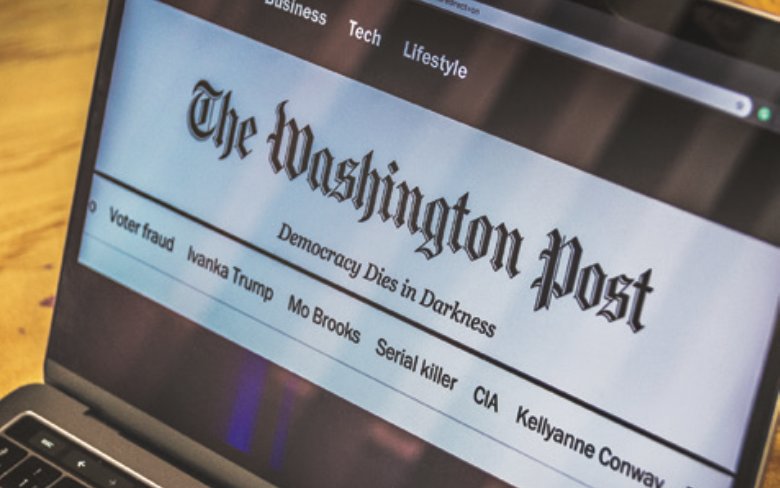
The Washington Post’s newsroom is well-experienced at deep-diving journalism and covering news of national significance. Still, this year, The Post is making a significant investment in telling the story of America in this precarious moment when democracy itself seems under assault. The Washington Post hopes to begin telling that story with meaningful coverage of states where there's an erosion in trust related to elections, and the very right to vote is being challenged.
Managing Editor Steven Ginsberg, Deputy National Editor Philip Rucker and National Editor Matea Gold introduced the Washington Post’s “Democracy Team” in mid-February 2022. Gold spoke with Editor & Publisher (E&P) via video conference in early April to expound on the initiative and how the team is coming together.

“The idea for this team grew out of our coverage of the 2020 campaign and then what ensued in 2021,” Matea Gold told E&P. “I was running our voting coverage and our political investigations team at the time. We put together sort of a precursor to this team — really, a group of reporters around the room who we aimed at the question of how voting would work in the pandemic.
“They actually ended up covering a long-running effort to subvert the results of the 2020 election, and as we documented and mapped what followed, throughout 2021, we realized that this was an ongoing story that was going to be something we needed to bring sustained resources to cover it, because there’s now such a widespread sense of distrust spread across the country and in many communities, about whether our elections are freely and fairly held,” she continued. “People are questioning whether they have fair access to the ballot. People are questioning whether results are fairly counted. And we feel that it’s part of The Post’s public service mission to document this in an authoritative and revelatory way.”

The plan is to deploy journalists to three initial posts, covering Georgia, Arizona and the upper Midwest. Those journalists will be the boots on the ground, reporting on the local, state and regional perspectives, but they’ll also collaborate with The Washington Post’s investigative journalists for national context. Politics Editor Peter Wallsten will lead the Democracy Team.
“It’s very important to us that the news and developments of what’s happening on the ground informs our bigger thematic stories,” Gold said. “We want the reporters who are experts and deeply sourced in those communities to be surfacing the pieces and the trends that we want to write about in a big way.”
One of the first state-based journalists to be named to the team is Matt Brown, who will cover Georgia. Brown is himself a Georgia native, and before joining the Democracy Team in late March, Brown reported for USA Today, where he was a White House correspondent. He has experience covering issues of national importance, including misinformation, conspiracies and social and racial justice protests.
In addition to Matt Brown in Georgia, Griff Witte was appointed editor of the Democracy Team on April 19.
“One of the things we want to do is make sure that there’s kind of a constant interplay and collaboration between the reporters based in the states and reporters who are covering this as part of a 30,000-foot elevation,” Gold explained.
In a mid-term year, voting and elections are at top-of-mind for the team, but the coverage and the team itself may grow.
“Democracy is a very broad term,” Gold acknowledged. “These reporters are going to be examining and documenting and digging into changes to voting laws across the country — how the rules of ballot access are being shaped by different advocacy groups, and how there’s a growing divide in our country about your experience of voting, depending on geography. And then we’ll also have a big focus on election administration, which is an aspect of coverage that news organizations, I don't think, had ever historically spent much time on because it usually was so non-controversial. But we have seen such a sustained effort to sow doubt about whether votes are being counted accurately.”
Another area the team will explore public distrust.
“We really want to tell illuminating stories that help people understand what it means if you lose faith in the idea that your elected representatives were actually elected — and fairly? What does it mean for your belief in your government,” Gold said. “And what does it mean for those public officials who are facing this level of doubt? Those are the three main areas of coverage, but I imagine we will go in lots of different directions, depending on how the story unfolds.”
Another question the team will explore is why America is so polarized and how that political division seeps into voting, election lobbying and legislation.
“One of the things I hear from readers all the time is a real sense of questioning the direction the country is taking because they don't recognize each other. Whether you’re in a red or a blue state, I hear that from people all across the political spectrum, and the mission I laid out for the national staff this year is that we have a real responsibility to explain America to itself at this moment,” Gold said.
“We really need to understand what the fissures are dividing us and how can we bring a sense of illumination and understanding to some of the big issues that are reshaping how we live our lives and how we believe our system of governance should work,” she suggested. “And, so, the story of democracy is a much bigger story. It’s a story of America at this moment.”
Gretchen A. Peck is a contributing editor to Editor & Publisher. She's reported for E&P since 2010 and welcomes comments at gretchenapeck@gmail.com.
Comments
No comments on this item Please log in to comment by clicking here